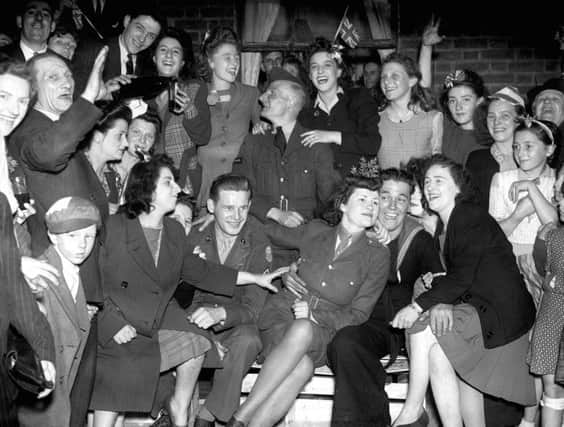VE Day: How our nation celebrated the defeat of Nazi tyranny


By the time Prime Minister Winston Churchill made his famous broadcast over the airwaves confirming the end of the war in Europe, millions of people had already poured on to the streets in jubilation.
London saw an estimated 250,000 people descend on The Mall and Buckingham Palace to celebrate the defeat of Nazi tyranny, and in Trafalgar Square, a hoarding at the base of Nelson’s Column simply read: “Victory Over Germany 1945.”
Advertisement
Hide AdAdvertisement
Hide AdChurchill made the official announcement in a national broadcast from the Cabinet room at 10 Downing Street at 3pm, to coincide with statements aired simultaneously in Washington and Moscow.
He spoke from the same room that former leader Neville Chamberlain announced Britain was at war with Germany on September 3, 1939.
Churchill addressed a massive crowd from the Ministry of Health building in Whitehall, saying: “This is your victory. It is the victory of the cause of freedom in every land. In all our long history we have never seen a greater day than this. Everyone, man or woman, has done their best.”
Advertisement
Hide AdAdvertisement
Hide AdThe Royal Family was also the focus of national unity when Victory in Europe was proclaimed. They had endured the London Blitz, including the bombing of Buckingham Palace in September 1940, which endeared them with the public.
King George VI spoke of a “complete and crushing victory” and both May 8 and 9 1945 were made public holidays.
But in spite of the relief and celebrations, Britain was still involved in the war with Japan and there would be more suffering and heartache before the Second World War finally came to an end in August.
Victory in Europe had also come at a huge cost. Thousands of women were widowed during the war and more than 264,000 men in Britain’s Armed Forces were killed during the conflict.
Advertisement
Hide AdAdvertisement
Hide AdOn the Home Front more than 60,500 male and female civilians were killed, leaving thousands of children either orphaned or without a mother or father.
British politics received a complete overhaul just a couple of months later with the ousting of its wartime leader in favour of a Labour government headed by Clement Attlee.
Churchill was seen as “yesterday’s man” and the nation, however indebted to him, was ready for a new beginning.